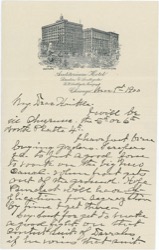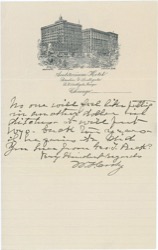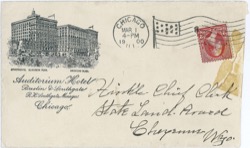Title: Letter from William F. Cody to C. L. Hinkle
Date: March 1, 1900
Author: Cody, William Frederick, 1846-1917
More metadata
[drawing]Drawing
Apartments. European Plan. American Plan.
Auditorium Hotel
Breslin & Southgate
R. H. Southgate, Manager.
Chicago, Mar 1st 1900
My. Dear Hinkle.
I will be in Cheyenne. The 5th or 6th North Platte 4th.
I have just been buying graders, Scrapers &c. to put a good force to work on the big new canal. when frost gets out of the ground. Hope Burdick will have application for segregation by time I get there— [1]
Say. dont forget to make a good fight on that contest suit of Darrahs if he wins that suit. [2]

[drawing]Drawing
Apartments. European Plan. American Plan.
Auditorium Hotel
Breslin & Southgate
R. H. Southgate, Manager.
No one will feel like putting in another dollar in ditches— it will put Wyo. back ten years if he gains it. did You hear from Geo. T. Beck?
Very kindest regards
W. F. Cody

[drawing]
Apartments. European Plan. American Plan.
Auditorium Hotel
Breslin & Southgate
R. H. Southgate, Manager.
Chicago.
Chicago ILL. Mar 1 4-PM 1900
[stamp]Postage stamp, red, invertedUnited States Postage 2 Two Cents 2
Hinkle - Chief Clerk
State Land. Board
Cheyenne, Wyo.
Note 1: In this context, the term "segregation" refers to the legal process of reserving a tract of undeveloped public land for a specific use. In this case, William F. Cody and his partners in the Shoshone Irrigation Company applied for a segregation under the Carey Act of 1894. [back]
Note 2: Hudson W. Darrah (1864-1929), a sawmill owner with other business interests in and around the town of Cody, had a history of legal disputes with the Shoshone Irrigation Company. In 1899, Darrah filed a protest against the issuance of land patents for portions of the company's Carey Act segregation including the Cody townsite, claiming that the company had not yet adequately irrigated the area in question. While Darrah's protest was not upheld when adjudicated by government authorities in July 1900, it did delay the acquisition of clear title to these lands by settlers and investors who had filed claims for them. Since the company's profitability depended on selling water rights to settlers who expected to gain clear title to the irrigated lands under the Carey Act, protests such as Darrah's were a threat to the business interests of William F. Cody and his partners. [back]
Title: Letter from William F. Cody to C. L. Hinkle
Source: McCracken Research Library (MRL), MS6.0095
Date: March 1, 1900
Author: Cody, William Frederick, 1846-1917
Topic: Buffalo Bill's Wyoming
People: Hinkle, Lorin Curtis, 1869-1931 Beck, George Washington Thornton, 1856-1943 Burdick, Charles W. (Charles Williams), 1860-1927 Darrah, Hudson W., 1864-1929
Editorial Statement | Conditions of Use
TEI encoded XML: View wfc.css00089.xml
Back to top
